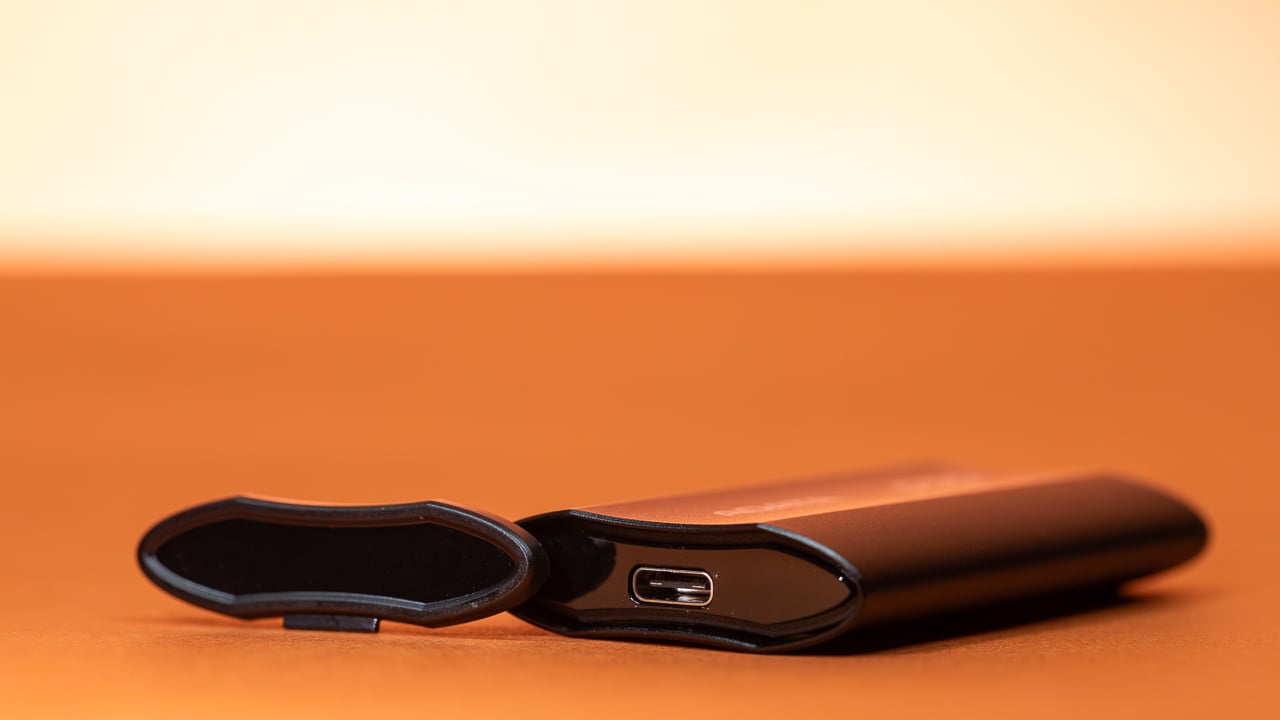-
Pros
- Modestly priced for a USB 3.2 Gen 2x2 SSD
- Fast in PCMark 10 Data Drive benchmark
- Meets IP68 water- and dust-resistance specification
- Rated drop-proof to MIL-STD-810G 516.6 standard
- Supports PS5 and Xbox One
-
Cons
- Few computers natively support the Gen 2x2 standard
ADATA SD810 Specs
| Bus Type | PCI Express 4.0 |
| Capacity (Tested) | 1 |
| Interface (Computer Side) | USB-C |
| Internal or External | External |
| NAND Type | QLC |
| Rated Maximum Sequential Read | 2000 |
| Rated Maximum Sequential Write | 2000 |
| Warranty Length | 5 |
The ADATA SD810 ($89.99 for 1TB as tested) is a small and inexpensive external solid-state drive, but don't let its size and affordability fool you: It's highly rugged and offers excellent storage performance, too. To get the most out of this SSD, you will need a computer that supports the USB 3.2 Gen 2x2 standard—you can add an expansion card to a desktop PC to achieve compatibility. Assuming you have Gen 2x2, the SD810 is an excellent, cost-effective drive and an easy pick as a PCMag Editors' Choice winner. (And even if you only have access to USB 3.2 Gen 2 connectivity, you'll still find it a fine value.)
Design: Impervious to Dust and Water
With the same basic form factor as the ADATA SE800 (which is slightly larger) and the ADATA Elite SE880, the SD810 is lightweight and highly portable. It measures 0.5 by 1.7 by 2.9 inches (HWD) and weighs 1.5 ounces.
 (Credit: Joseph Maldonado)
(Credit: Joseph Maldonado)The SD810's brushed aluminum case, which comes in glossy black ("Obsidian Black") or silver-gray ("Meteorite Silver"), contains an M.2 Type-2242 solid-state drive, formatted as exFAT by default. (The drive is easily reformatted and is compatible with Windows, Mac, Android, and Linux, as well as Xbox One and PS5 consoles.) Rubber ends protect the unit from dust and water; you simply remove the tabbed end to expose the USB-C port and an LED activity light.
 (Credit: Joseph Maldonado)
(Credit: Joseph Maldonado)The SD810 is the heir apparent to the ADATA Elite SE880, a Gen 2x2 SSD with which it shares the same basic feature set. When we tested the SE880, it came in just 500GB and 1TB capacities, but has since added 2TB and 4TB models.
The SE880 lacks the tethered, rubberized port cover found on the ADATA SE800; with the SD810 it has been restored, enabling it to achieve an ingress protection rating of IP68. This tells us it's certified to be both dustproof (complete protection against sand, dirt, and dust) and waterproof to a depth of 3 feet for up to 30 minutes. Only a few external drives we've reviewed, including the SD800, can match this IP rating. The SD810 also meets the MIL-STD-810G 516.6 impact resistance standard to easily survive accidental drops and jarring.
 (Credit: Joseph Maldonado)
(Credit: Joseph Maldonado)The SD810's USB-C port supports the USB 3.2 Gen 2x2 standard, with a maximum throughput of up to 20Gbps, but to avail yourself of this blazing speed you will need either a compatible computer (few models, even recent ones, have 2x2 ports), or to add a Gen 2x2 expansion card. Check out our USB-C explainer for more on the differences among the USB interfaces. Also note that with USB4—Gen 2x2's heir apparent, with throughput speed ratings of up to 40Gbps for its faster variant—starting to show up in computers and external drives (check out our first review of a USB4 external SSD, the OWC Express 1M2), USB 3.2 Gen 2x2 may be superseded without ever coming into its own.
The SD810 is available in 1TB, 2TB, and 4TB capacities.
ADATA backs the SD810 with a five-year warranty, which many major SSD makers match, although some external SSDs have just three-year warranties.
Testing the ADATA SD810: Zippy at Everyday Tasks
We test USB 3.2 Gen 2x2 external SSDs using PC Labs' Windows 10 storage testbed, a desktop PC built on an Asus Prime X299 Deluxe motherboard with an Intel Core i9-10980XE Extreme Edition CPU and an Nvidia GeForce graphics card. We use the motherboard's native 10GBps USB 3.2 Gen 2 port for testing compatible drives; for Gen 2x2 drives like the SD810 we use a Gen 2x2 port added via an Orico PCIe expansion card. USB 3.2 Gen 2 ports are common enough, but Gen 2x2 ports (which double the theoretical top bandwidth) are much rarer.
We subjected the SD810 to our usual suite of external solid-state drive benchmarks, comprising Crystal DiskMark 6.0, the PCMark 10 Data Drive Benchmark, Blackmagic's Disk Speed Test, and our own folder transfer test. As the drive comes preformatted in exFAT, which is compatible with both Macs and Windows machines, we ran the latter two tests first, on an Apple MacBook Pro.
Then we reformatted the drive in NTFS to run Crystal DiskMark and PCMark 10 on our Windows testbed. Crystal DiskMark's sequential speed tests provide a traditional measure of drive throughput, simulating best-case, straight-line transfers of large files. The PCMark 10 Data Drive test measures an SSD's aptitude in performing a variety of everyday tasks.
 (Credit: Joseph Maldonado)
(Credit: Joseph Maldonado)In Crystal DiskMark testing, the SD810 fell just short of its sequential read-speed rating and well short of its write-speed rating. These scores are typical of USB 3.2 Gen 2x2 SSDs, few of which match their read-speed ratings; several other Gen 2x2 SSDs had similar write-speed scores. Still, these scores are much higher than those from USB 3.2 Gen 2 SSDs, which typically have throughput ratings of 1,050MBps for both read and write speeds.
The SD810 turned in an excellent score in PCMark 10, with only the Seagate FireCuda Gaming SSD scoring higher among the USB 3.2 Gen 2x2 SSDs we have tested.
Verdict: Capable, Cheap, and Rugged
The ADATA SD810 lacks the hardware-based encryption of the Crucial X10 Pro, an Editors' Choice-winning Gen 2x2 high-performance external SSD, but it is more impervious to dust and water, performed better in the PCMark 10 workaday storage-task benchmark, and comes in at a lower price, even at its 4TB capacity. So the SD810 earns its own Editors' Choice award, and is a great option as a budget external SSD, especially if you have a desktop PC that supports USB 3.2 Gen 2x2, or are willing to invest in an expansion card to upgrade your desktop computer.

